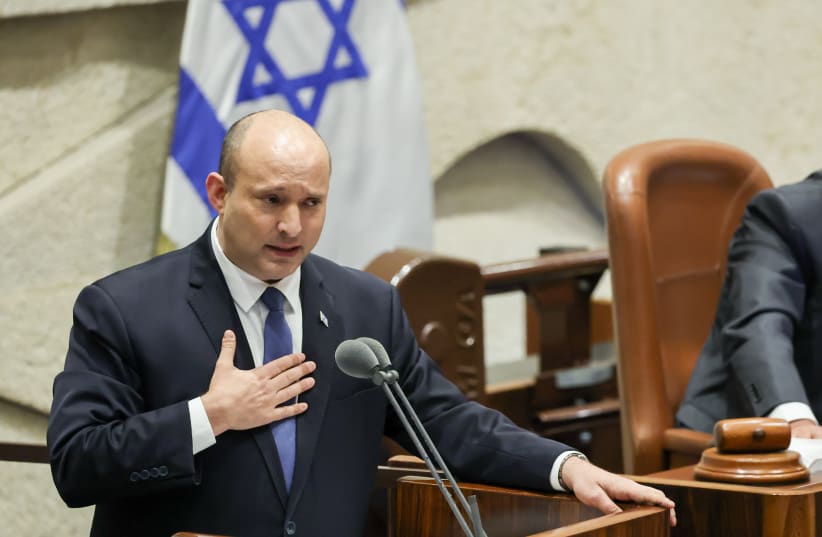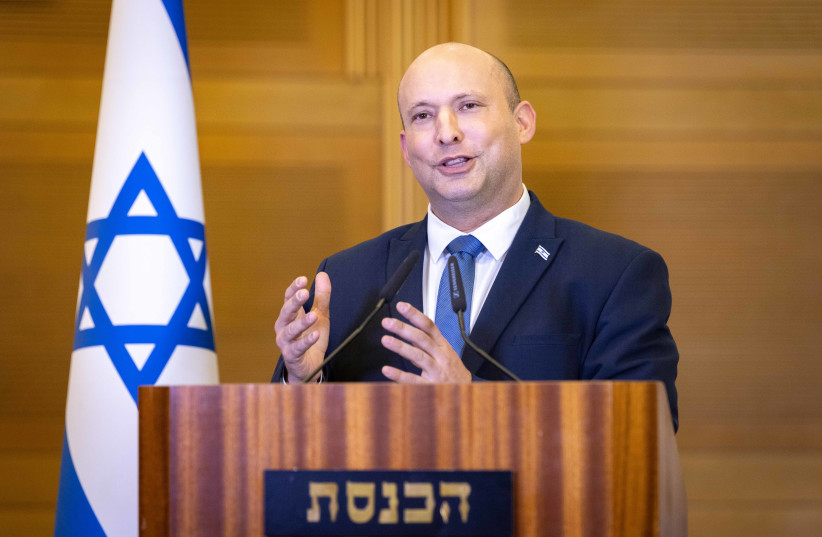Former prime minister Naftali Bennett told an audience Monday night that the reported death of Israeli democracy was exaggerated, and he urged American Jews to make their concerns known to the new far-right government rather than walk away. He also said that he plans on returning to Israeli politics.
“There are a lot of foolish words flying about,” Bennett said Monday night in a talk at Manhattan’s Reform Temple Emanu-El, referring to various proposals being made by newly installed Israeli cabinet members. “There’s a core of responsibility that will fend off the most radical of the suggestions, but to be fair, I don’t know.”
Speaking onstage with Eric Goldstein, CEO of UJA-Federation of New York, Bennett appeared to be referring to two critics of LGBT rights in Israel, Religious Zionism Head Bezalel Smotrich and Noam Party leader Avi Maoz, when he said, “No one’s going to touch the LGBT community in Israel. No one’s going to mess around with it. Israel is robust.”
“No one’s going to touch the LGBT community in Israel. No one’s going to mess around with it. Israel is robust.”
Naftali Bennett
Regarding his return to Israeli politics, Bennett made comparisons to Yitzhak Rabin and Benjamin Netanyahu, both of whom were prime ministers before leaving politics and returned to power years later. He vowed likewise to return.
What did Bennett say over American Jewry's fears of a far-right Israeli government?
Bennett, prime minister from 2021 to 2022 in the rotation government that preceded Netanyahu’s return to power in December, spoke at the Reform synagogue at a particularly tense time in Diaspora-Israel relations. Leaders of groups representing American Judaism’s largely liberal community have expressed deep concern over proposals by Netanyahu’s new coalition partners to greatly expand Jewish settlement in the West Bank, curb minority rights and strengthen Orthodox control in matters of Jewish religious status.
Two weeks ago, Goldstein issued a statement saying that he is “alarmed” by recent reforms introduced by Israel’s newly installed justice minister Yariv Levin, which would allow Israel’s parliament to override decisions by the Supreme Court with a simple majority and further politicize the selection of its justices. He implored Netanyahu to reject the proposed judicial overhaul.
On this too, Bennett sought to be reassuring. He criticized a Supreme Court that he said had “gradually usurped authority that it didn’t have,” but said that it needed only a “small little nudge” to address those concerns. “I smell a compromise coming,” he said.
“I recommend you enter into a dialogue with the government” in Israel, he urged the audience. “Speak up and talk with the government. Israelis sometimes think the world revolves around Israel and don’t always see the broader view of Jews around the world and the world itself. I think sharing with the Israeli leadership what’s going on and what it means and what the implications are, is meaningful. There are ministers who have never been abroad, so you are what you are experiencing.”
What did Bennett say about the Russia-Ukraine War?
Bennett, who stepped away from politics ahead of the November election, also spoke at length about his efforts to broker a ceasefire between Russia and Ukraine in the first months of Moscow’s unprovoked war on its neighbor.
Bennett asserted that in meetings with Vladimir Putin, the Russian president said he would no longer demand regime change and demilitarization in Ukraine.
Meanwhile, Ukraine’s President Volodymyr Zelensky told him that his country would “no longer want to join NATO, which was the very reason for the war.” Bennett suggested that the negotiations fell apart because of Ukrainian objections. “I want to be cautious here,” he said. “The message [from Zelensky] was ‘we don’t want to run yet to a ceasefire for various reasons…. Putin was an aggressor and he needs to pay the price.’”
What did the audience say about Israeli democracy?
Despite Bennett’s reassurances that Israel’s democracy remains robust, many audience members remained wary about the new government.
“I’m concerned about what I’m seeing in Israel,” said Asaf Jacobi, 39, who earned his law degree in Israel and served in its military. “They’re trying to unstabilize the checks and balances in Israel to the extreme. [Netanyahu] is clearly putting his interests over the country, and you can see people in the streets are really not happy with what’s happening. It’s too religious and too extreme.”
Debra Delorenzo, who has lived in the Upper East Side her whole life, said Bennett “did a wonderful job. He’s a good speaker and engages the audience.” And yet, she said, “I wanted him to address certain things and he skirted around them. I wanted him to talk about the occupation. I wanted him to talk about [Netanyahu], who I can’t stand. Israel is a democracy, but it’s losing its panache about it. It’s become more of an occupier. I love Israel, and I’m Jewish, but there are things going on there that [Bennett] didn’t address.”
One elderly woman, who declined to give her name, welcomed the political changes in Israel.
“We love the government,” she said, “and we think that the change in the judicial system should have occurred long ago.”

